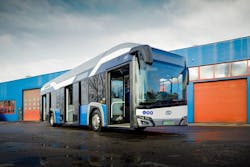Solaris European Bus Supplier Orders 62 H2 Fuel Cell Engines from Ballard Power Systems
Europe’s Solaris Bus & Coach is ordering 62 hydrogen fuel cell engines from Ballard Power Systems to power its mass transit buses in Germany and Poland, the companies announced this week.
The latest order is among 350 H2-fuel cell engines ordered overall by Solaris so far this year. Fuel cell technologies can use carbon-free hydrogen to generate power, while boasting a longer range and shorter refueling times than battery electric models, according to reports.
Ballard plans to deliver most of the fuel cell engines in 2024.
“The impressive order activity from Solaris gives us confidence in our expectations that the current momentum in our bus vertical will continue,” Ballard Chief Commercial Officer David Mucciacciaro said in a statement. “The commercial traction of hydrogen-powered fuel cell buses in Europe proves the market increasingly understands fuel cell bus advantages, including range, refueling time, similar operating practices as diesel, and scalable infrastructure.”
Solar has supplied customers in Europe with more than 140 fuel cell city buses so far. Among its electric and fuel cell bus customers include Sicilian carrier AMTS Catania, SWK Mobil Krefeld in Germany, Nobina Stockholm in Sweden, and MZK Opole in Poland, among others.
Ballard Power Systems has been revving up the pace of its fuel cell engine market growth lately. The company this week also announced an order for 2.4 MW of fuel cell engines from Canadian Pacific Kanas City. Those 12, 200-kW fuel cell engines are expected to be delivered by the end of this year.
This summer, Ballard announced it had signed a letter of intent with Ford Trucks to supply a fuel cell system as part of an H2-powered vehicle prototype project. The Ford integration will work in 120-kW FCmove-XD fuel cell engines into the F-MAX 44-ton long-haul tractor truck.
Many transportation industry experts contend that hydrogen fuel cell engines might be a better fit to decarbonize the long-haul trucking industry. The hydrogen supply and generation infrastructure, however, is still undeveloped to meet those goals in the near term.
Track New Developments in the C&I Energy Transition by Subscribing to our free EnergyTech newsletter
About the Author
Rod Walton, EnergyTech Managing Editor
Managing Editor
For EnergyTech editorial inquiries, please contact Managing Editor Rod Walton at [email protected].
Rod Walton has spent 17 years covering the energy industry as a newspaper and trade journalist. He formerly was energy writer and business editor at the Tulsa World. Later, he spent six years covering the electricity power sector for Pennwell and Clarion Events. He joined Endeavor and EnergyTech in November 2021.
Walton earned his Bachelors degree in journalism from the University of Oklahoma. His career stops include the Moore American, Bartlesville Examiner-Enterprise, Wagoner Tribune and Tulsa World.
EnergyTech is focused on the mission critical and large-scale energy users and their sustainability and resiliency goals. These include the commercial and industrial sectors, as well as the military, universities, data centers and microgrids. The C&I sectors together account for close to 30 percent of greenhouse gas emissions in the U.S.
He was named Managing Editor for Microgrid Knowledge and EnergyTech starting July 1, 2023
Many large-scale energy users such as Fortune 500 companies, and mission-critical users such as military bases, universities, healthcare facilities, public safety and data centers, shifting their energy priorities to reach net-zero carbon goals within the coming decades. These include plans for renewable energy power purchase agreements, but also on-site resiliency projects such as microgrids, combined heat and power, rooftop solar, energy storage, digitalization and building efficiency upgrades.

